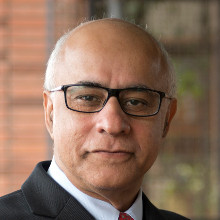[Photograph by Simon under Creative Commons]
Wise among mountaineers have a saying: when the biggest allure presents itself, ask a simple question - "you can but should you?"
As an entrepreneur, should I be confident or cautious; should I take risks or avoid them?
Entrepreneurs are path-makers. They create a path where none existed before. That in itself implies that there may be uncertainties at multiple levels. As the entrepreneur begins creating a new path, assumptions can prove wrong, unscripted events may present themselves and having dealt with all that, at the end, success is not guaranteed. On the other hand, there may be unusual gain in terms of personal satisfaction and wealth that may more than compensate the amount of risk taken. That is why, entrepreneurship asks for comfort with uncertainty and the ability to take risks. That ability, termed as risk-appetite, is partly genetic and partly acquired and an entrepreneur must see it as a gift. But risk appetite is one thing and risky behaviour is quite something else.
A path-maker cannot have risky behaviour because a lot of things depend on that individual. That is why management guru, the late CK Prahalad, always chided his cohort of business leaders that our job is not to take risks, our job is to de-risk the future. He would always draw the picture of a moat filled with crocodiles and a fortress beyond. As a leader, as one contemplates the future, in this case the fort and whatever lies inside to be conquered, my job is to use strategy to cross the moat. To do that, Prahalad would ask that the leader define bite-size steps. To Prahalad, risk was an over-glorified thing. Even as an entrepreneur builds things from scratch, at the end of the day, an enterprise has customers, employees and investors - should the entrepreneur glorify risk or is the truly great thing to do is to focus on creating strategy to de-risk the risk?
The idea of risk invariably leads us to the idea of taking bets. It is quite logical because every risk opens up multiple choices, each choice implies multiple possible consequences. In dealing with uncertainties, the entrepreneur must make a choice over the many other options. In other words, take a bet. David Yoffie, professor at Harvard Business School, who was an independent director with Mindtree for many years, chaired our strategic initiatives committee and always asked the management team, "What can you bet on, without betting the company?"
As an entrepreneur goes past the start-up stage, on to a time that the enterprise becomes a young adult, there are several other lives that become part of the journey. These are employees who don't just come to seek employment; they want meaningful work in a safe place so that they can marry, have kids, take a house loan and build a life. Just the same way, there are people who build businesses around your business, these are your suppliers and finally, there are your investors who have trusted you with their money. Even as an entrepreneur seeks to build new value, he cannot be selfish and usurp the enterprise for his own ego. The entrepreneur must not put to risk the employees, suppliers, customers and investors and sometimes if it is the only way, then he must be able to secure them and not abandon them, before moving on.
The entrepreneurial journey need not be a solitary one, particularly in matters of management of risk. Every great entrepreneur has a formal and informal set of sounding boards: from the board of directors, a ring of trusted advisors, paid consultants and peer networks that one may confide in. These then serve as a prism through which options and consequences can be weighed. These are people who can ask critical questions and, in the imminent possibility of ego-hijack, bring the entrepreneur to terra firma. But these relationships must be built on trust and respect; on willingness to sometimes defer to counsel when it may not be convenient or palatable. So, seek the counsel of the wise each time you are required to assume significant amount of risk that could impact your stakeholders.
The greatest risks are not entrepreneurial; the highest among all risks are those that pertain a person’s own life. Among adventure sports that often pose such risks, is mountaineering. In that context, I want to tell you about mountaineers who scale the Everest. When climbers go past all the hurdles and can see the peak, before embarking on the final assault, they must check with base camp for permission. The tricky thing is that the permission is not always granted. While the base camp is not the one that can see the peak, it is often that the mountaineer cannot see the risk - the weather condition at the top changes treacherously, and by the minute. To be in that moment, mountaineers train all their life, give up everything to come up here and have no guarantee that life would give them a second chance. Everything they can see, between themselves and the peak, looks doable, they feel they are in great shape; yet base camp says, it isn't a good idea, come back for another day. Picture yourself in that position: should you come back or march on? Wise among mountaineers have a saying: when the biggest allure presents itself, ask a simple question - "you can but should you?"
As we build a business, there are things we must take bets on; after all, as the good old saying goes, "no risk, no gain". The question is, what is reasonable; are there things with which you want to take risks, are there things on which you will seek the base camp’s counsel and are there things on which you don’t ever want to take a risk? In my opinion, you don’t want to do something that poses a "reputational risk". We must always remember, reputation is the new capital and once lost, unlike people, material, money and information, this capital does not easily come back. Taking a risk here is a no-no. But stay with me, we need to talk some more on the idea of risk; so see you on this page in a fortnight.
If you have any questions mail us as askbagchi@foundingfuel.com
[This article appeared concurrently in Mint]


